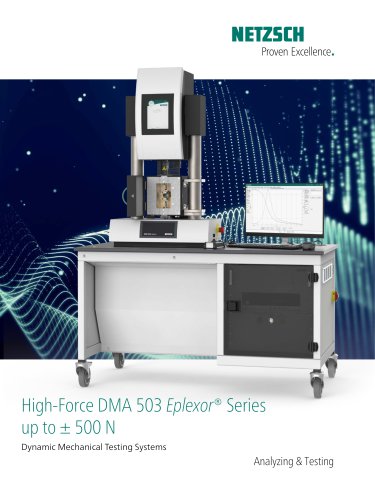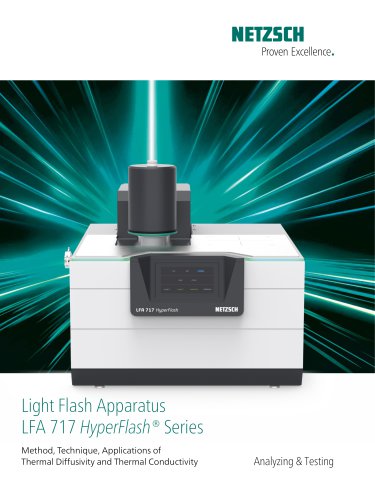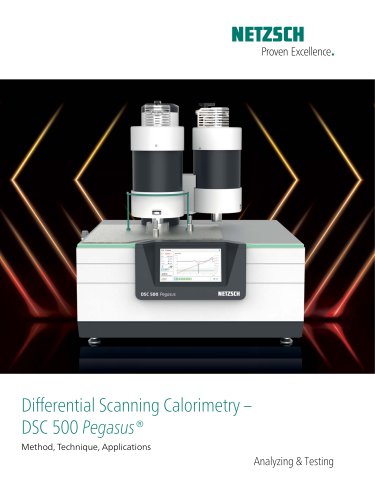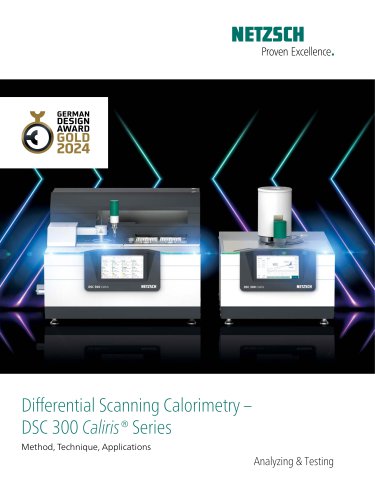 Website:
NETZSCH Analyzing & Testing
Website:
NETZSCH Analyzing & Testing
Group: NETZSCH
Catalog excerpts

Differential Scanning Calorimetry – DSC 3500 Sirius Method, Technique and Applications Analyzing & Testing
Open the catalog to page 1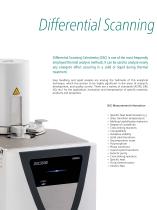
Differential Scanning Differential Scanning Calorimetry (DSC) is one of the most frequently employed thermal analysis methods. It can be used to analyze nearly any energetic effect occurring in a solid or liquid during thermal treatment. Easy handling and rapid analysis are among the hallmarks of this analytical technique, which has proven to be highly significant in the areas of research, development, and quality control. There are a variety of standards (ASTM, DIN, ISO, etc.) for the application, evaluation and interpretation of specific materials, products and properties. Specific heat...
Open the catalog to page 2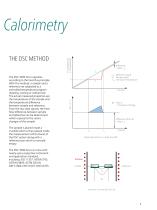
The DSC 3500 Sirius operates according to the heat-flux principle. With this method, a sample and a reference are subjected to a controlled temperature program (heating, cooling or isothermal). The actual measured properties are the temperature of the sample and the temperature difference between sample and reference. From the raw data signals, the heat flow difference between sample and reference can be determined which represents the caloric changes of the sample. Reference signal Sample signal Transition temperature Area A ~ Transition enthalpy Difference (from 0) ~ Mass · cp The sample...
Open the catalog to page 3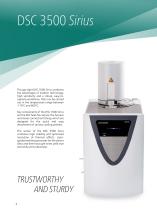
The gas-tight DSC 3500 Sirius combines the advantages of modern technology, high sensitivity and a robust, easy-tooperate workhorse. Tests can be carried out in the temperature range between -170°C and 600°C. Key components of the DSC 3500 Sirius are the DSC heat-flux sensor, the furnace and clever connection fittings which are designed for the quick and easy attachment of various cooling systems. The sensor of the DSC 3500 Sirius combines high stability and optimized resolution of thermal effects. Laserguided welding processes for the sensor disks and thermocouple wires yield true...
Open the catalog to page 4
ADVANTAGES TO YOUR BENEFIT Reliable Furnace and Sensor Optimized design of the furnace and the sensor results in a highly stable baseline and excellent signal-tonoise ratio. Variable Gases and Cooling Options Protective and purge gas inlets are, of course, standard features of the unit. For improved cooling times and subambient temperature tests, various cooling options can be connected. Of course, a versatile gas switching and flow control system are also available. Efficient Automatic Sample Changer For applications with a high sample throughput, we offer an automatic sample changer (ASC)...
Open the catalog to page 5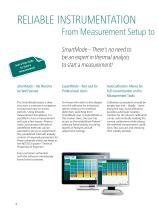
RELIABLE INSTRUMENTATION licks ew c f a t Jus rt a to sta ment ure meas From Measurement Setup to SmartMode – There's no need to be an expert in thermal analysis to start a measurement! SmartMode – No Need to be Well Versed ExpertMode – Not Just for Professional Users AutoCalibration Allows for Full Concentration on the Measurement Tasks The SmartMode boasts a clear structure, a consistent navigation concept and easy-to-access buttons. Using Wizards measurement templates), it is possible to start a measurement with just a few inputs. Alternatively, customized methods or predefined methods...
Open the catalog to page 6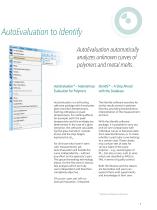
AutoEvaluation to Identify AutoEvaluation automatically analyzes unknown curves of polymers and metal melts. AutoEvaluation* – Autonomous Evaluation for Polymers Identify* – A Step Ahead with the Database AutoEvaluation is a self-acting software package which evaluates glass transition temperatures, melting enthalpies or peak temperatures. For melting effects, for example, both the peak temperature and the enthalpy are determined; in the case of a glass transition, the software calculates Tg (the glass transition temperature) and the step height, expressed as Δcp. The Identify software...
Open the catalog to page 7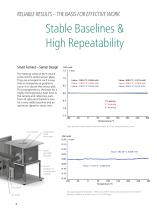
RELIABLE RESULTS – THE BASIS FOR EFFECTIVE WORK Stable Baselines & High Repeatability Smart Furnace – Sensor Design The heating wires of the furnace surround the entire sensor plate. They are arranged in such a way that no temperature gradients occur in or above the sensor disk. 2.60 °C, 0.008 mW This arrangement is the basis for a highly homogeneous heat flow to the sample and reference pans from all sides and therefore also for a very stable baseline and an optimum signal-to-noise ratio. Value: -100.0 °C, 0.004 mW Value: -100.0 °C, 0.009 mW Value: -100.0 °C, 0.010 mW Value: 300.0 °C,...
Open the catalog to page 8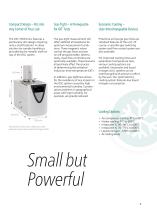
Compact Design – Fits into Any Corner of Your Lab Gas-Tight – A Prerequisite for OIT Tests Economic Cooling – User-Interchangeable Devices The DSC 3500 Sirius features a particularly slim design requiring only a small footprint. A clever solution for sample handling is provided by the metallic shelf on top of the DSC system. The gas-tight measurement cell offers defined atmospheres for optimum measurement conditions. Three magnetic valves control the gas flows and are on/off programmable. Alternatively, mass flow controllers are optionally available. These features all positively affect the...
Open the catalog to page 9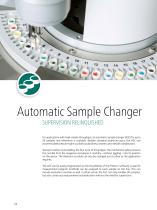
Automatic Sample Changer SUPERVISION RELINQUISHED For applications with high sample throughput, an automatic sample changer (ASC) for up to 20 samples and references is available. Besides standard aluminum pans, the ASC can accommodate pressure-tight crucibles (autoclaves), ceramic and metallic sample pans. Transport safety is provided by the four arms of the gripper. This mechanism safely removes the crucible from the magazine and places it carefully – without jiggling – into its position on the sensor. The reference crucible can also be changed out as often as the application requires....
Open the catalog to page 10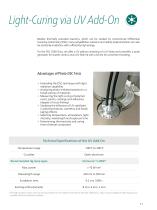
Light-Curing via UV Add-On Besides thermally activated reactions, which can be studied by conventional Differential Scanning Calorimetry (DSC), many polyaddition reactions and radical polymerizations can also be started by irradiation with sufficiently high energy. For the DSC 3500 Sirius, we offer a UV add-on consisting of a UV lamp and controller, a pulse generator for shutter control, and a UV fiber lid with a lid rest for convenient handling. Advantages of Photo-DSC Tests Extending the DSC technique with light radiation capability Analyzing photo-initiated reactions in a broad variety...
Open the catalog to page 11All NETZSCH Analyzing & Testing catalogs and technical brochures
-
DMA 303 Eplexor
24 Pages
-
LFA 717 HyperFlash® Series
28 Pages
-
DSC 300 Caliris Series
28 Pages
-
STA 509 Jupiter Series
28 Pages
-
TG 309 Libra Series
24 Pages
-
DEA 288 Ionic
20 Pages
-
STA 2500 Regulus
12 Pages
-
NTA Guarded Hot Plate Series
16 Pages
-
TMA 402 F1/F3 Hyperion®
16 Pages
-
Rosand Series
20 Pages
-
Accelerating Rate Calorimetry
20 Pages
-
NTA HotBoxes
16 Pages
-
DIL 402 Expedis Select/Supreme
28 Pages
-
DIL 402 Expedis Classic
16 Pages
-
Product Overview
12 Pages
-
NETZSCH Energy Solutions
40 Pages
-
Advanced Materials Testing
32 Pages
-
NTA Fire Testing Systems
20 Pages
-
Kinetics NEO
20 Pages
-
TG-FTIR - product brochure
24 Pages
-
TA-QMS Coupling
28 Pages
-
Kinexus Prime DSR Series
20 Pages
-
Kinexus Prime Series
20 Pages
-
HMOR 422
1 Pages
-
RUL/CIC 421
1 Pages
-
Cone Calorimeter TCC 918
12 Pages
-
Thermal Insulation Materials
24 Pages
-
SBA 458 Nemesis®
24 Pages
-
NETZSCH NEVIO Instrument Series
24 Pages
-
LFA 427 - product brochure
24 Pages
-
DMA GABO EPLEXOR up to 1500°C
12 Pages
-
GABOMETER®
8 Pages



